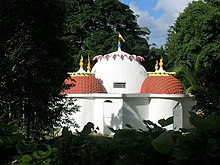Indo-Guadeloupeans
This article includes a list of generalreferences,butit lacks sufficient correspondinginline citations.(August 2017) |
| Total population | |
|---|---|
| 35,617[1] | |
| Regions with significant populations | |
| Basse-Terre·Capesterre-Belle-Eau·Saint-François | |
| Languages | |
| Guadeloupean Creole French·Standard French·Tamil·Telugu·English·Hindi·otherlanguages of South Asia | |
| Religion | |
| Christianity(majoritallyCatholicwithProtestantminorities)·Hinduism·Islam | |
| Related ethnic groups | |
| Indo-Martiniquais·Indo-Caribbean·Tamil diaspora·Telugu diaspora·Tamil people·Telugu people·Indian people·Indian diaspora |

Indo-Guadeloupeansare mostly descended from indentured workers who came mostly fromSouth Indiain the late 19th century. There are currently about 35,617 people of Indian origin living inGuadeloupe,making it home to one of the largest South Indian populations in the Caribbean.
History[edit]
Tamils in Guadeloupe trace their roots to over 40,000 indentured workers who were brought fromIndiatoGuadeloupein 1861 to work on plantations through an agreement reached betweenFranceand theUnited Kingdom.The importation of Indian labor was gradually discontinued after 1883 as a result of adoption of a policy by theBritish Governmentagainst recruitment of labor in its territories and also because of the high mobility of Indian labor.
Over 10,000 of them perished as a result of difficult living and working conditions and the rest continued to be treated harshly until they secured some political rights in 1904 due toHenry Sidambarom's efforts. It was in 1923 that Guadeloupeans of Indian descent were granted citizenship and the right to vote. A few Indians were indentured toSaint Martin(prior to 2007 Saint Martin was a part of Guadeloupe).
After migration stopped, the Indian community gradually acculturated to the rest of the population, so much so that few of the Indians on the island speakTamilor other Indian languages any more. However, third or fourth generationpersons of Indian originstill maintain links with India in many different ways, such as adopting Indian names. Many Indians in Guadeloupe adopted French and Christian names.
There have also been Indians, specificallySindhis,migrating to the island in recent years, setting up businesses such as gifts shops.
Current status[edit]
The city ofBasse-Terrein Guadeloupe andPondicherryin India have been designated as twin cities to promote cultural links and exchanges.[2]
The Indian community in Guadeloupe is estimated to be approximately 35,617 in a population of under 396,000. However, ethnicity statistics are not done by the French government. There are several associations to promoteIndian culturein Guadeloupe, usually run by people of Indian origin. They are fairly active in organising cultural activities in all the principal towns, namely,Pointe-a-Pitre,Le Moule,Port-Louis,Capesterre-Belle-EauandSaint-Claude.
One important Indian association isL‘Association Culturelle Guadeloupéenne des Amis de L’Inde,which has over 300 members and 2000 associates.
There are a sizeable number of HinduTamiltemples that are located in Basse-Terre, and other regions.[3]Tamilsin Guadeloupe started studying their own language in an effort to preserve their culture and traditions. Guadeloupe Tamils initiated links withTamil Canadiansin developing their language and culture.
The French principle oflaicité,meaning “secularism”, is practiced in Guadeloupe. The French Republic forces Indian cultural associations to produce messages about Hinduism in Guadeloupe that display Indian culture independently from Hinduism. However, it has proven to be controversial due to the French practice oflaique,found in the second article of the French constitution which expresses the principle of separation between government affairs and religious institutions. Indo-Guadeloupeans and Guadaloupean Hindus practicelaicitéfreely in the public arena. There is ongoing controversy since France is alaiquestate, thus religion is to be practiced privately. According to Meritxell Martín-i-Pardo:
As French citizens, they [Guadeloupean Hindus] know that because France is a laïque state, religious practice is to be a private matter. But this is not to say that religion cannot be practiced freely or legally in France, only that it must be practiced privately. They also know that the separation of church and state, however, means that because the state conceives of religion and culture as two separate entities, in their associative work they must present their religious tradition independently of their culture.[4]
Recently, the 152nd anniversary of the arrival of the Hindus Tamil in Guadeloupe was observed. The Indian Associations in the territory are in the process of forming a committee, which will start working to realize the event.
Examples[edit]
Some Indo-Guadeloupians have acceded to important posts in the public and private sectors. Dr.Henri Bangouheld the post of Senator from Guadeloupe in theFrench Senate.Ernest Moutoussamyhas been the Député of Guadeloupe in theNational Assembly of France.[5]
See also[edit]
- Indo-Caribbean
- Indo-Martiniquais
- Indians in French Guiana
- Indians in France
- Tamils in France
- Indian diaspora
- Tamil diaspora
- Telugu diaspora
- Hinduism in Guadeloupe
References[edit]
- ^"Guadeloupe Population 2022".World Population Review.Retrieved6 August2022.
- ^"People of other Central and South America countries"(PDF).Indiandiaspora.nic.in.Archived fromthe original(PDF)on 2016-03-03.Retrieved2017-08-29.
- ^"Les îles de Guadeloupe".Archived fromthe originalon 2007-12-01.Retrieved2009-08-03.
- ^Martín-i-Pardo, Meritxell (28 January 2011)."The Articulation of a French Civil Hinduism".Journal of the American Academy of Religion.79(2): 503.doi:10.1093/jaarel/lfq108– via Oxford Academic.
- ^"Indo-Caribbean Heritage - Sense of Identity".Archived fromthe originalon 2009-07-09.Retrieved2009-08-03.
External links[edit]
- Indian Diaspora in the Caribbean
- 152nd birthday of the arrival of the Hindu Tamil in Guadeloupe
- Francophone Indians in a remote corner of the Caribbean reclaim their Hindu identity
- Guadeloupe Tourism
Further reading[edit]
- Brahmanism Abroad: On Caribbean Hinduism as an Ethnic Religion
- East Indians in the Caribbean
- "Some Reflections on the Hindu Diaspora".
{{cite journal}}:Cite journal requires|journal=(help) - Inde-Guadeloupe: Hommage à la mémoire,(India-Guadeloupe: Tribute to memory),Ernest Moutoussamy,Éditions Jasor, 2016,ISBN979-1090675537,OCLC1015317793
